Human Resource Life Cycle Management and HR Strategy Analysis
VerifiedAdded on 2023/01/19
|17
|5723
|84
Report
AI Summary
This report provides a comprehensive analysis of human resource life cycle management within the hospitality sector, emphasizing the importance of ethical considerations and strategic alignment. It explores the various stages of the HR cycle, from attracting and training employees to performance management and staff retention. The report highlights the impact of legal and ethical considerations on hospitality businesses, as well as the need for effective coordination and integration of different departmental functions. It examines employee motivation, the role of an Events Manager, and the significance of self-management skills. The report also discusses performance management plans and the importance of customer satisfaction, offering insights into how to optimize the HR life cycle for success in the hospitality industry.

Paraphrase This Document
Need a fresh take? Get an instant paraphrase of this document with our AI Paraphraser
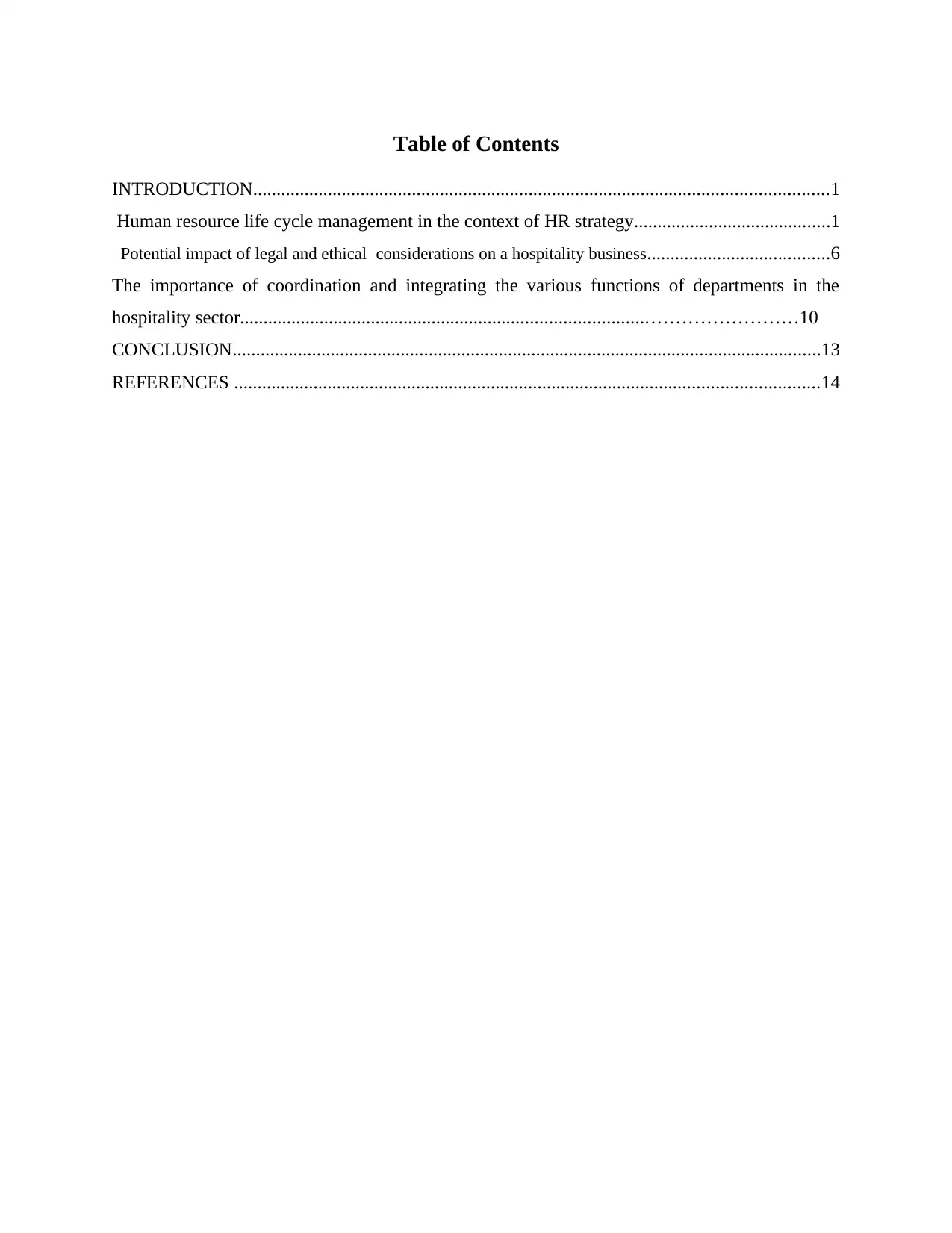
Table of Contents
INTRODUCTION...........................................................................................................................1
Human resource life cycle management in the context of HR strategy..........................................1
Potential impact of legal and ethical considerations on a hospitality business.......................................6
The importance of coordination and integrating the various functions of departments in the
hospitality sector.......................................................................................……………………10
CONCLUSION..............................................................................................................................13
REFERENCES .............................................................................................................................14
INTRODUCTION...........................................................................................................................1
Human resource life cycle management in the context of HR strategy..........................................1
Potential impact of legal and ethical considerations on a hospitality business.......................................6
The importance of coordination and integrating the various functions of departments in the
hospitality sector.......................................................................................……………………10
CONCLUSION..............................................................................................................................13
REFERENCES .............................................................................................................................14
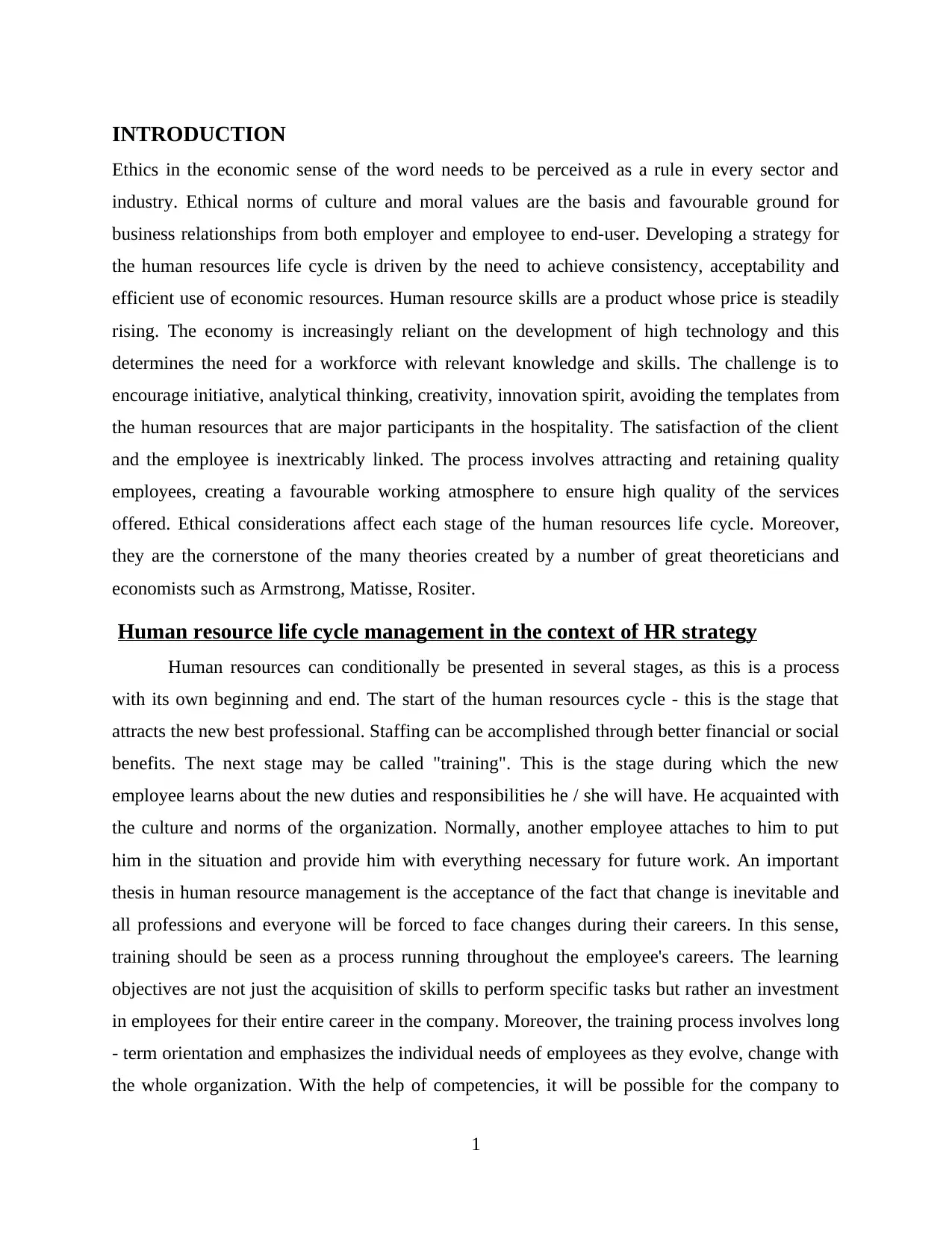
INTRODUCTION
Ethics in the economic sense of the word needs to be perceived as a rule in every sector and
industry. Ethical norms of culture and moral values are the basis and favourable ground for
business relationships from both employer and employee to end-user. Developing a strategy for
the human resources life cycle is driven by the need to achieve consistency, acceptability and
efficient use of economic resources. Human resource skills are a product whose price is steadily
rising. The economy is increasingly reliant on the development of high technology and this
determines the need for a workforce with relevant knowledge and skills. The challenge is to
encourage initiative, analytical thinking, creativity, innovation spirit, avoiding the templates from
the human resources that are major participants in the hospitality. The satisfaction of the client
and the employee is inextricably linked. The process involves attracting and retaining quality
employees, creating a favourable working atmosphere to ensure high quality of the services
offered. Ethical considerations affect each stage of the human resources life cycle. Moreover,
they are the cornerstone of the many theories created by a number of great theoreticians and
economists such as Armstrong, Matisse, Rositer.
Human resource life cycle management in the context of HR strategy
Human resources can conditionally be presented in several stages, as this is a process
with its own beginning and end. The start of the human resources cycle - this is the stage that
attracts the new best professional. Staffing can be accomplished through better financial or social
benefits. The next stage may be called "training". This is the stage during which the new
employee learns about the new duties and responsibilities he / she will have. He acquainted with
the culture and norms of the organization. Normally, another employee attaches to him to put
him in the situation and provide him with everything necessary for future work. An important
thesis in human resource management is the acceptance of the fact that change is inevitable and
all professions and everyone will be forced to face changes during their careers. In this sense,
training should be seen as a process running throughout the employee's careers. The learning
objectives are not just the acquisition of skills to perform specific tasks but rather an investment
in employees for their entire career in the company. Moreover, the training process involves long
- term orientation and emphasizes the individual needs of employees as they evolve, change with
the whole organization. With the help of competencies, it will be possible for the company to
1
Ethics in the economic sense of the word needs to be perceived as a rule in every sector and
industry. Ethical norms of culture and moral values are the basis and favourable ground for
business relationships from both employer and employee to end-user. Developing a strategy for
the human resources life cycle is driven by the need to achieve consistency, acceptability and
efficient use of economic resources. Human resource skills are a product whose price is steadily
rising. The economy is increasingly reliant on the development of high technology and this
determines the need for a workforce with relevant knowledge and skills. The challenge is to
encourage initiative, analytical thinking, creativity, innovation spirit, avoiding the templates from
the human resources that are major participants in the hospitality. The satisfaction of the client
and the employee is inextricably linked. The process involves attracting and retaining quality
employees, creating a favourable working atmosphere to ensure high quality of the services
offered. Ethical considerations affect each stage of the human resources life cycle. Moreover,
they are the cornerstone of the many theories created by a number of great theoreticians and
economists such as Armstrong, Matisse, Rositer.
Human resource life cycle management in the context of HR strategy
Human resources can conditionally be presented in several stages, as this is a process
with its own beginning and end. The start of the human resources cycle - this is the stage that
attracts the new best professional. Staffing can be accomplished through better financial or social
benefits. The next stage may be called "training". This is the stage during which the new
employee learns about the new duties and responsibilities he / she will have. He acquainted with
the culture and norms of the organization. Normally, another employee attaches to him to put
him in the situation and provide him with everything necessary for future work. An important
thesis in human resource management is the acceptance of the fact that change is inevitable and
all professions and everyone will be forced to face changes during their careers. In this sense,
training should be seen as a process running throughout the employee's careers. The learning
objectives are not just the acquisition of skills to perform specific tasks but rather an investment
in employees for their entire career in the company. Moreover, the training process involves long
- term orientation and emphasizes the individual needs of employees as they evolve, change with
the whole organization. With the help of competencies, it will be possible for the company to
1
⊘ This is a preview!⊘
Do you want full access?
Subscribe today to unlock all pages.

Trusted by 1+ million students worldwide
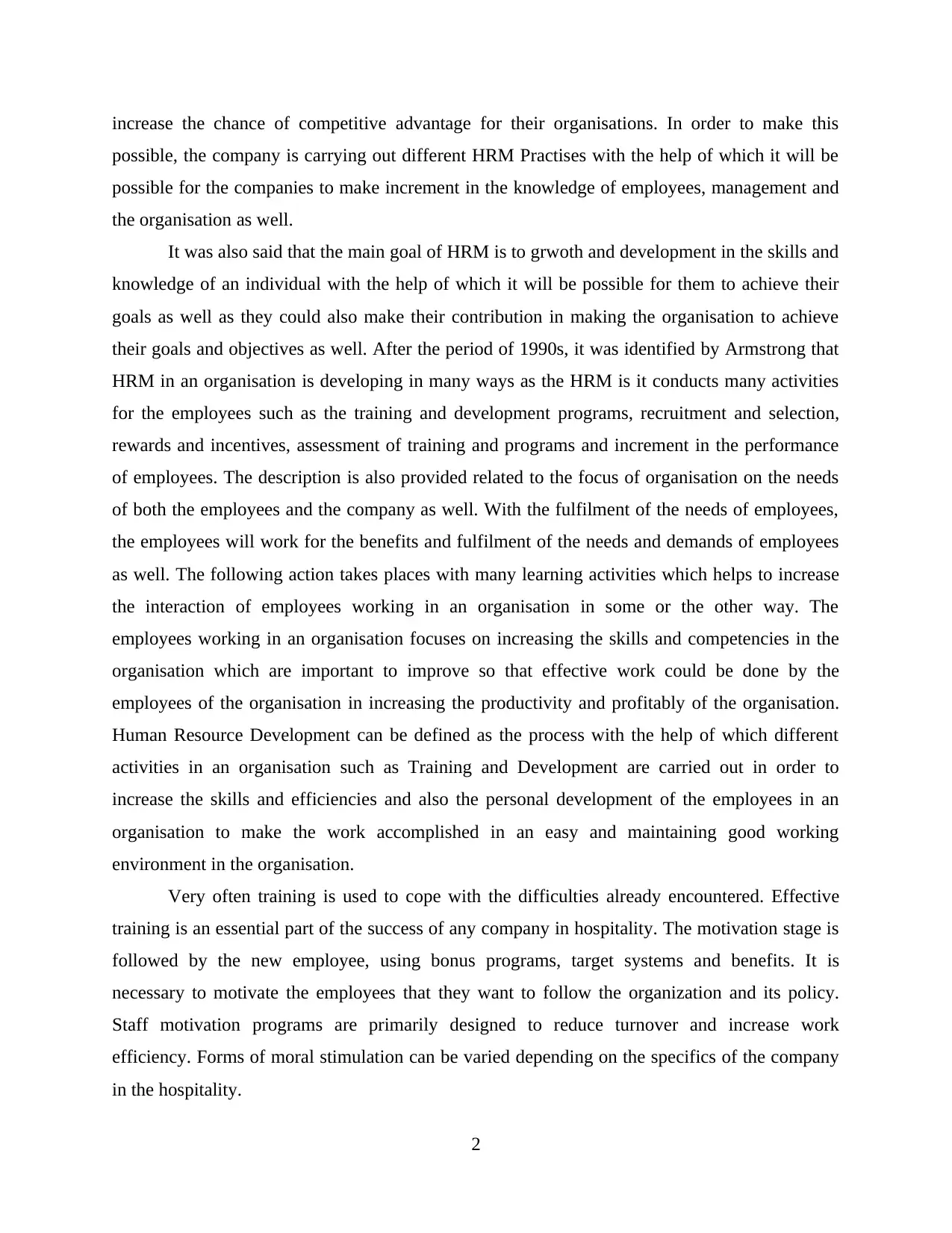
increase the chance of competitive advantage for their organisations. In order to make this
possible, the company is carrying out different HRM Practises with the help of which it will be
possible for the companies to make increment in the knowledge of employees, management and
the organisation as well.
It was also said that the main goal of HRM is to grwoth and development in the skills and
knowledge of an individual with the help of which it will be possible for them to achieve their
goals as well as they could also make their contribution in making the organisation to achieve
their goals and objectives as well. After the period of 1990s, it was identified by Armstrong that
HRM in an organisation is developing in many ways as the HRM is it conducts many activities
for the employees such as the training and development programs, recruitment and selection,
rewards and incentives, assessment of training and programs and increment in the performance
of employees. The description is also provided related to the focus of organisation on the needs
of both the employees and the company as well. With the fulfilment of the needs of employees,
the employees will work for the benefits and fulfilment of the needs and demands of employees
as well. The following action takes places with many learning activities which helps to increase
the interaction of employees working in an organisation in some or the other way. The
employees working in an organisation focuses on increasing the skills and competencies in the
organisation which are important to improve so that effective work could be done by the
employees of the organisation in increasing the productivity and profitably of the organisation.
Human Resource Development can be defined as the process with the help of which different
activities in an organisation such as Training and Development are carried out in order to
increase the skills and efficiencies and also the personal development of the employees in an
organisation to make the work accomplished in an easy and maintaining good working
environment in the organisation.
Very often training is used to cope with the difficulties already encountered. Effective
training is an essential part of the success of any company in hospitality. The motivation stage is
followed by the new employee, using bonus programs, target systems and benefits. It is
necessary to motivate the employees that they want to follow the organization and its policy.
Staff motivation programs are primarily designed to reduce turnover and increase work
efficiency. Forms of moral stimulation can be varied depending on the specifics of the company
in the hospitality.
2
possible, the company is carrying out different HRM Practises with the help of which it will be
possible for the companies to make increment in the knowledge of employees, management and
the organisation as well.
It was also said that the main goal of HRM is to grwoth and development in the skills and
knowledge of an individual with the help of which it will be possible for them to achieve their
goals as well as they could also make their contribution in making the organisation to achieve
their goals and objectives as well. After the period of 1990s, it was identified by Armstrong that
HRM in an organisation is developing in many ways as the HRM is it conducts many activities
for the employees such as the training and development programs, recruitment and selection,
rewards and incentives, assessment of training and programs and increment in the performance
of employees. The description is also provided related to the focus of organisation on the needs
of both the employees and the company as well. With the fulfilment of the needs of employees,
the employees will work for the benefits and fulfilment of the needs and demands of employees
as well. The following action takes places with many learning activities which helps to increase
the interaction of employees working in an organisation in some or the other way. The
employees working in an organisation focuses on increasing the skills and competencies in the
organisation which are important to improve so that effective work could be done by the
employees of the organisation in increasing the productivity and profitably of the organisation.
Human Resource Development can be defined as the process with the help of which different
activities in an organisation such as Training and Development are carried out in order to
increase the skills and efficiencies and also the personal development of the employees in an
organisation to make the work accomplished in an easy and maintaining good working
environment in the organisation.
Very often training is used to cope with the difficulties already encountered. Effective
training is an essential part of the success of any company in hospitality. The motivation stage is
followed by the new employee, using bonus programs, target systems and benefits. It is
necessary to motivate the employees that they want to follow the organization and its policy.
Staff motivation programs are primarily designed to reduce turnover and increase work
efficiency. Forms of moral stimulation can be varied depending on the specifics of the company
in the hospitality.
2
Paraphrase This Document
Need a fresh take? Get an instant paraphrase of this document with our AI Paraphraser
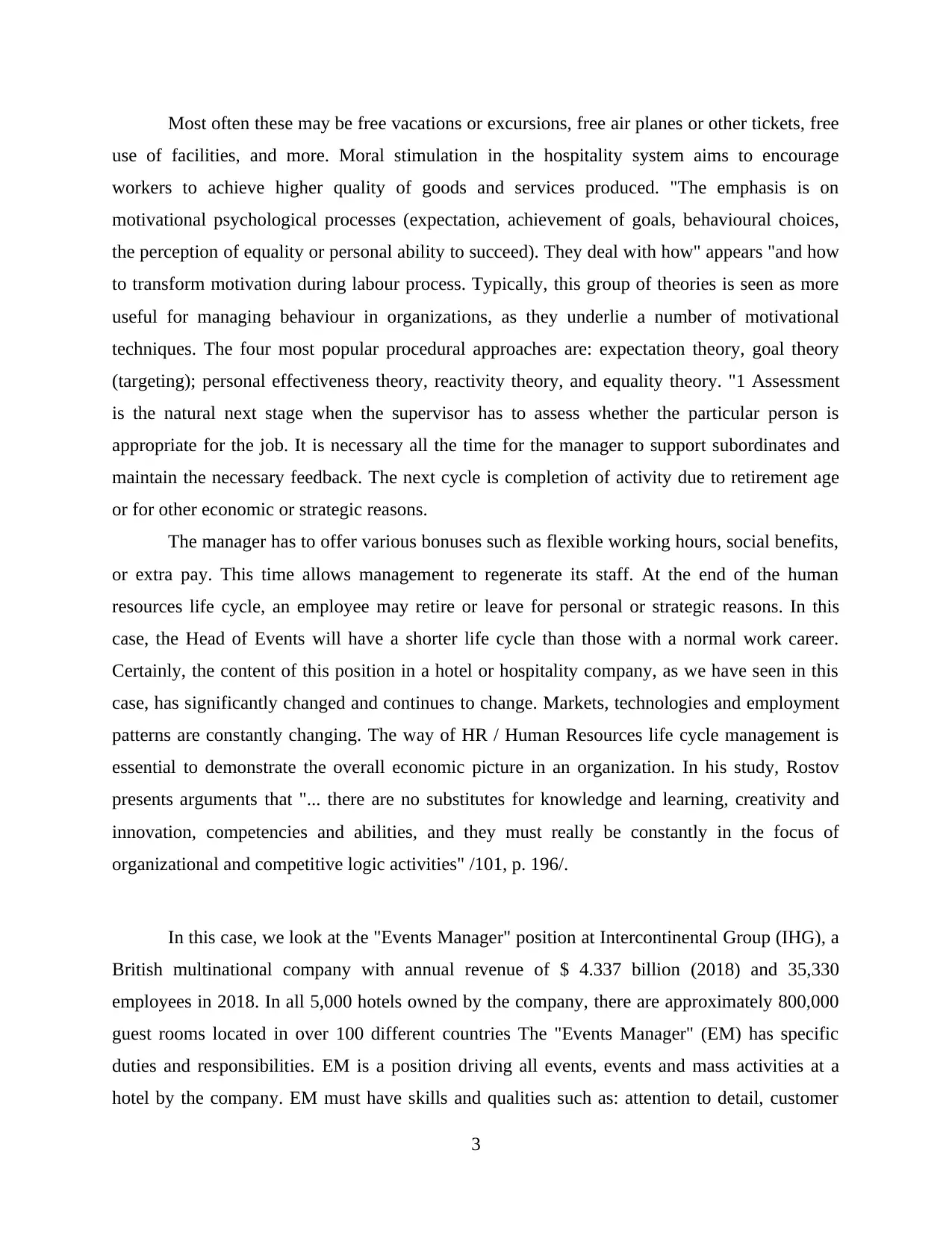
Most often these may be free vacations or excursions, free air planes or other tickets, free
use of facilities, and more. Moral stimulation in the hospitality system aims to encourage
workers to achieve higher quality of goods and services produced. "The emphasis is on
motivational psychological processes (expectation, achievement of goals, behavioural choices,
the perception of equality or personal ability to succeed). They deal with how" appears "and how
to transform motivation during labour process. Typically, this group of theories is seen as more
useful for managing behaviour in organizations, as they underlie a number of motivational
techniques. The four most popular procedural approaches are: expectation theory, goal theory
(targeting); personal effectiveness theory, reactivity theory, and equality theory. "1 Assessment
is the natural next stage when the supervisor has to assess whether the particular person is
appropriate for the job. It is necessary all the time for the manager to support subordinates and
maintain the necessary feedback. The next cycle is completion of activity due to retirement age
or for other economic or strategic reasons.
The manager has to offer various bonuses such as flexible working hours, social benefits,
or extra pay. This time allows management to regenerate its staff. At the end of the human
resources life cycle, an employee may retire or leave for personal or strategic reasons. In this
case, the Head of Events will have a shorter life cycle than those with a normal work career.
Certainly, the content of this position in a hotel or hospitality company, as we have seen in this
case, has significantly changed and continues to change. Markets, technologies and employment
patterns are constantly changing. The way of HR / Human Resources life cycle management is
essential to demonstrate the overall economic picture in an organization. In his study, Rostov
presents arguments that "... there are no substitutes for knowledge and learning, creativity and
innovation, competencies and abilities, and they must really be constantly in the focus of
organizational and competitive logic activities" /101, p. 196/.
In this case, we look at the "Events Manager" position at Intercontinental Group (IHG), a
British multinational company with annual revenue of $ 4.337 billion (2018) and 35,330
employees in 2018. In all 5,000 hotels owned by the company, there are approximately 800,000
guest rooms located in over 100 different countries The "Events Manager" (EM) has specific
duties and responsibilities. EM is a position driving all events, events and mass activities at a
hotel by the company. EM must have skills and qualities such as: attention to detail, customer
3
use of facilities, and more. Moral stimulation in the hospitality system aims to encourage
workers to achieve higher quality of goods and services produced. "The emphasis is on
motivational psychological processes (expectation, achievement of goals, behavioural choices,
the perception of equality or personal ability to succeed). They deal with how" appears "and how
to transform motivation during labour process. Typically, this group of theories is seen as more
useful for managing behaviour in organizations, as they underlie a number of motivational
techniques. The four most popular procedural approaches are: expectation theory, goal theory
(targeting); personal effectiveness theory, reactivity theory, and equality theory. "1 Assessment
is the natural next stage when the supervisor has to assess whether the particular person is
appropriate for the job. It is necessary all the time for the manager to support subordinates and
maintain the necessary feedback. The next cycle is completion of activity due to retirement age
or for other economic or strategic reasons.
The manager has to offer various bonuses such as flexible working hours, social benefits,
or extra pay. This time allows management to regenerate its staff. At the end of the human
resources life cycle, an employee may retire or leave for personal or strategic reasons. In this
case, the Head of Events will have a shorter life cycle than those with a normal work career.
Certainly, the content of this position in a hotel or hospitality company, as we have seen in this
case, has significantly changed and continues to change. Markets, technologies and employment
patterns are constantly changing. The way of HR / Human Resources life cycle management is
essential to demonstrate the overall economic picture in an organization. In his study, Rostov
presents arguments that "... there are no substitutes for knowledge and learning, creativity and
innovation, competencies and abilities, and they must really be constantly in the focus of
organizational and competitive logic activities" /101, p. 196/.
In this case, we look at the "Events Manager" position at Intercontinental Group (IHG), a
British multinational company with annual revenue of $ 4.337 billion (2018) and 35,330
employees in 2018. In all 5,000 hotels owned by the company, there are approximately 800,000
guest rooms located in over 100 different countries The "Events Manager" (EM) has specific
duties and responsibilities. EM is a position driving all events, events and mass activities at a
hotel by the company. EM must have skills and qualities such as: attention to detail, customer
3
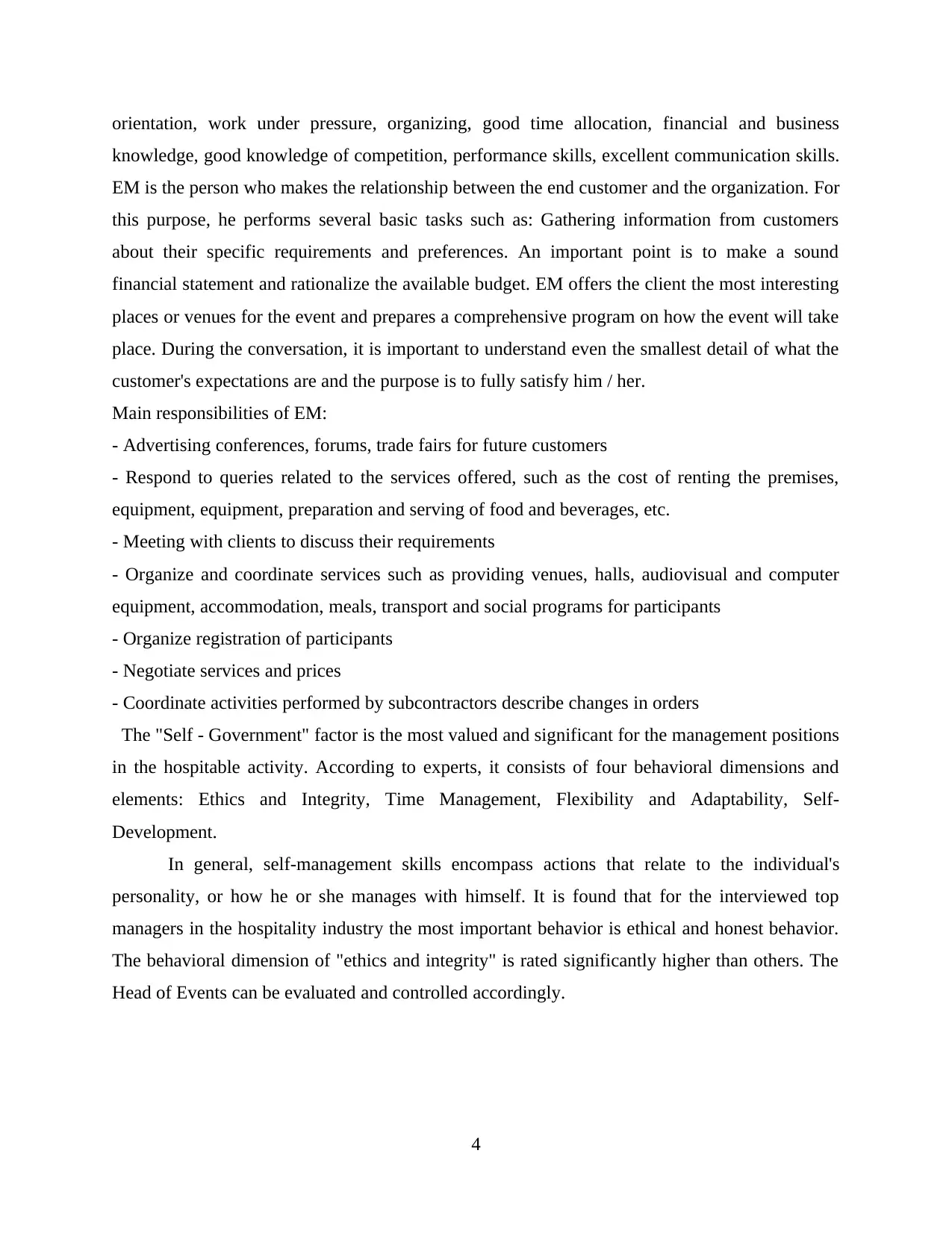
orientation, work under pressure, organizing, good time allocation, financial and business
knowledge, good knowledge of competition, performance skills, excellent communication skills.
EM is the person who makes the relationship between the end customer and the organization. For
this purpose, he performs several basic tasks such as: Gathering information from customers
about their specific requirements and preferences. An important point is to make a sound
financial statement and rationalize the available budget. EM offers the client the most interesting
places or venues for the event and prepares a comprehensive program on how the event will take
place. During the conversation, it is important to understand even the smallest detail of what the
customer's expectations are and the purpose is to fully satisfy him / her.
Main responsibilities of EM:
- Advertising conferences, forums, trade fairs for future customers
- Respond to queries related to the services offered, such as the cost of renting the premises,
equipment, equipment, preparation and serving of food and beverages, etc.
- Meeting with clients to discuss their requirements
- Organize and coordinate services such as providing venues, halls, audiovisual and computer
equipment, accommodation, meals, transport and social programs for participants
- Organize registration of participants
- Negotiate services and prices
- Coordinate activities performed by subcontractors describe changes in orders
The "Self - Government" factor is the most valued and significant for the management positions
in the hospitable activity. According to experts, it consists of four behavioral dimensions and
elements: Ethics and Integrity, Time Management, Flexibility and Adaptability, Self-
Development.
In general, self-management skills encompass actions that relate to the individual's
personality, or how he or she manages with himself. It is found that for the interviewed top
managers in the hospitality industry the most important behavior is ethical and honest behavior.
The behavioral dimension of "ethics and integrity" is rated significantly higher than others. The
Head of Events can be evaluated and controlled accordingly.
4
knowledge, good knowledge of competition, performance skills, excellent communication skills.
EM is the person who makes the relationship between the end customer and the organization. For
this purpose, he performs several basic tasks such as: Gathering information from customers
about their specific requirements and preferences. An important point is to make a sound
financial statement and rationalize the available budget. EM offers the client the most interesting
places or venues for the event and prepares a comprehensive program on how the event will take
place. During the conversation, it is important to understand even the smallest detail of what the
customer's expectations are and the purpose is to fully satisfy him / her.
Main responsibilities of EM:
- Advertising conferences, forums, trade fairs for future customers
- Respond to queries related to the services offered, such as the cost of renting the premises,
equipment, equipment, preparation and serving of food and beverages, etc.
- Meeting with clients to discuss their requirements
- Organize and coordinate services such as providing venues, halls, audiovisual and computer
equipment, accommodation, meals, transport and social programs for participants
- Organize registration of participants
- Negotiate services and prices
- Coordinate activities performed by subcontractors describe changes in orders
The "Self - Government" factor is the most valued and significant for the management positions
in the hospitable activity. According to experts, it consists of four behavioral dimensions and
elements: Ethics and Integrity, Time Management, Flexibility and Adaptability, Self-
Development.
In general, self-management skills encompass actions that relate to the individual's
personality, or how he or she manages with himself. It is found that for the interviewed top
managers in the hospitality industry the most important behavior is ethical and honest behavior.
The behavioral dimension of "ethics and integrity" is rated significantly higher than others. The
Head of Events can be evaluated and controlled accordingly.
4
⊘ This is a preview!⊘
Do you want full access?
Subscribe today to unlock all pages.

Trusted by 1+ million students worldwide
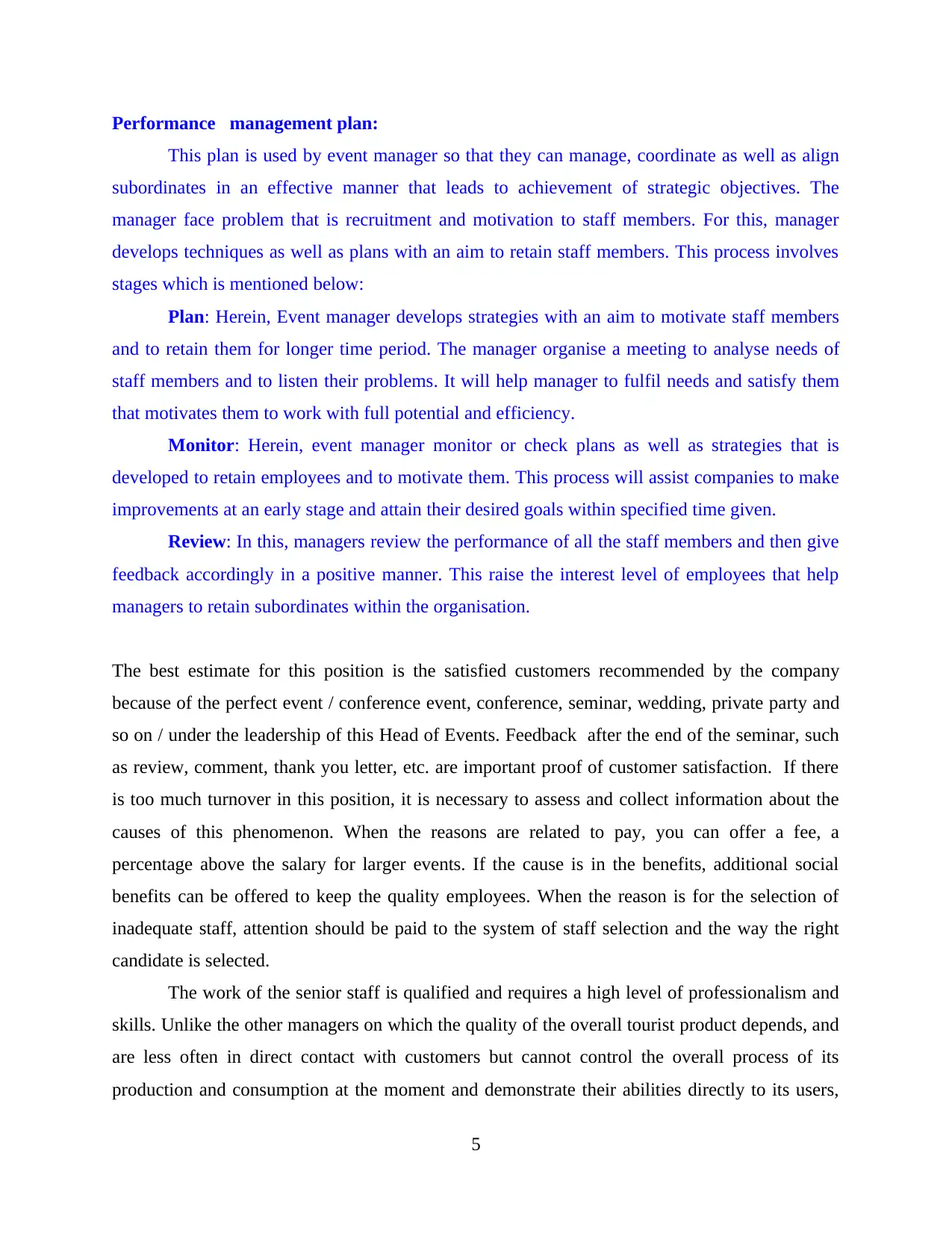
Performance management plan:
This plan is used by event manager so that they can manage, coordinate as well as align
subordinates in an effective manner that leads to achievement of strategic objectives. The
manager face problem that is recruitment and motivation to staff members. For this, manager
develops techniques as well as plans with an aim to retain staff members. This process involves
stages which is mentioned below:
Plan: Herein, Event manager develops strategies with an aim to motivate staff members
and to retain them for longer time period. The manager organise a meeting to analyse needs of
staff members and to listen their problems. It will help manager to fulfil needs and satisfy them
that motivates them to work with full potential and efficiency.
Monitor: Herein, event manager monitor or check plans as well as strategies that is
developed to retain employees and to motivate them. This process will assist companies to make
improvements at an early stage and attain their desired goals within specified time given.
Review: In this, managers review the performance of all the staff members and then give
feedback accordingly in a positive manner. This raise the interest level of employees that help
managers to retain subordinates within the organisation.
The best estimate for this position is the satisfied customers recommended by the company
because of the perfect event / conference event, conference, seminar, wedding, private party and
so on / under the leadership of this Head of Events. Feedback after the end of the seminar, such
as review, comment, thank you letter, etc. are important proof of customer satisfaction. If there
is too much turnover in this position, it is necessary to assess and collect information about the
causes of this phenomenon. When the reasons are related to pay, you can offer a fee, a
percentage above the salary for larger events. If the cause is in the benefits, additional social
benefits can be offered to keep the quality employees. When the reason is for the selection of
inadequate staff, attention should be paid to the system of staff selection and the way the right
candidate is selected.
The work of the senior staff is qualified and requires a high level of professionalism and
skills. Unlike the other managers on which the quality of the overall tourist product depends, and
are less often in direct contact with customers but cannot control the overall process of its
production and consumption at the moment and demonstrate their abilities directly to its users,
5
This plan is used by event manager so that they can manage, coordinate as well as align
subordinates in an effective manner that leads to achievement of strategic objectives. The
manager face problem that is recruitment and motivation to staff members. For this, manager
develops techniques as well as plans with an aim to retain staff members. This process involves
stages which is mentioned below:
Plan: Herein, Event manager develops strategies with an aim to motivate staff members
and to retain them for longer time period. The manager organise a meeting to analyse needs of
staff members and to listen their problems. It will help manager to fulfil needs and satisfy them
that motivates them to work with full potential and efficiency.
Monitor: Herein, event manager monitor or check plans as well as strategies that is
developed to retain employees and to motivate them. This process will assist companies to make
improvements at an early stage and attain their desired goals within specified time given.
Review: In this, managers review the performance of all the staff members and then give
feedback accordingly in a positive manner. This raise the interest level of employees that help
managers to retain subordinates within the organisation.
The best estimate for this position is the satisfied customers recommended by the company
because of the perfect event / conference event, conference, seminar, wedding, private party and
so on / under the leadership of this Head of Events. Feedback after the end of the seminar, such
as review, comment, thank you letter, etc. are important proof of customer satisfaction. If there
is too much turnover in this position, it is necessary to assess and collect information about the
causes of this phenomenon. When the reasons are related to pay, you can offer a fee, a
percentage above the salary for larger events. If the cause is in the benefits, additional social
benefits can be offered to keep the quality employees. When the reason is for the selection of
inadequate staff, attention should be paid to the system of staff selection and the way the right
candidate is selected.
The work of the senior staff is qualified and requires a high level of professionalism and
skills. Unlike the other managers on which the quality of the overall tourist product depends, and
are less often in direct contact with customers but cannot control the overall process of its
production and consumption at the moment and demonstrate their abilities directly to its users,
5
Paraphrase This Document
Need a fresh take? Get an instant paraphrase of this document with our AI Paraphraser
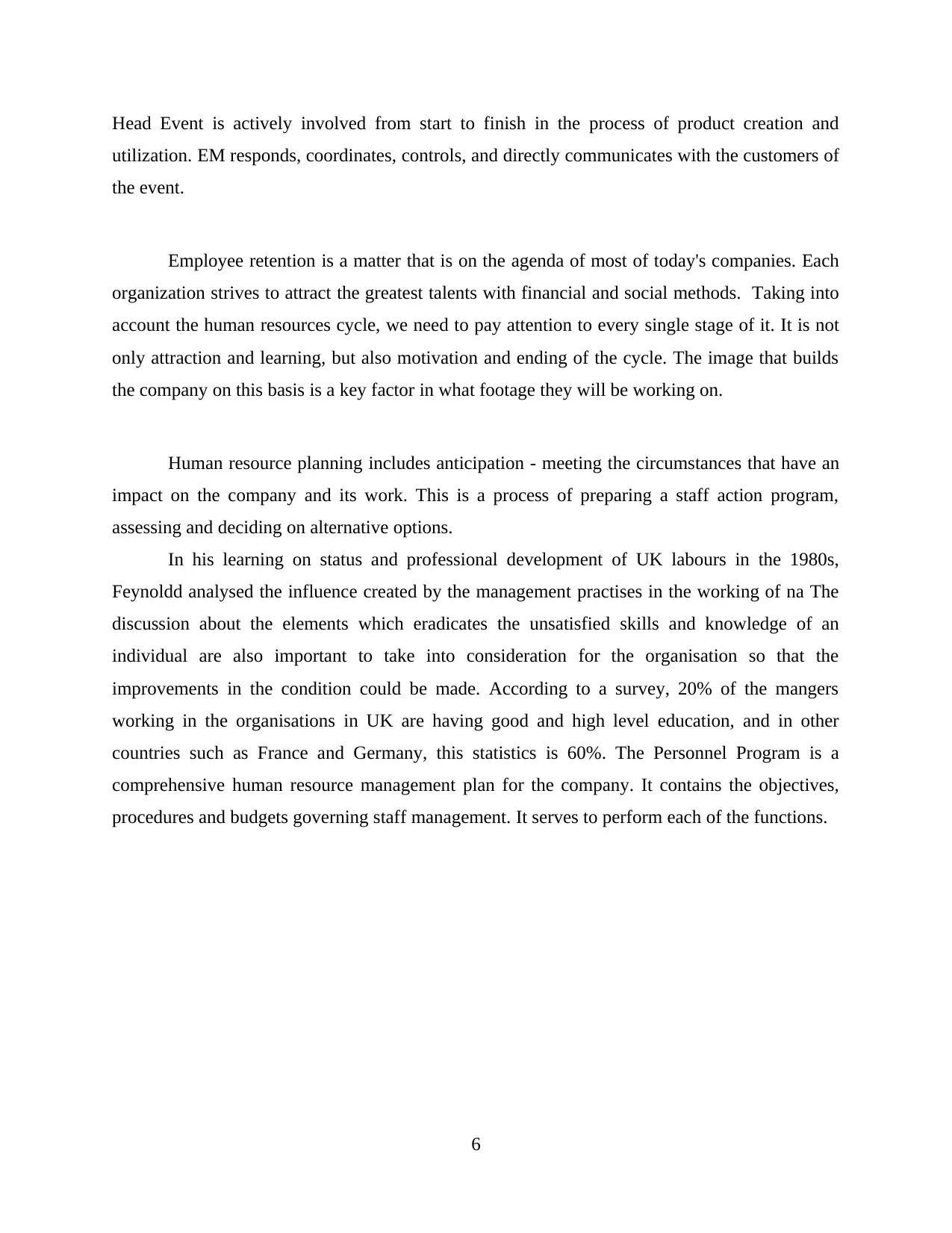
Head Event is actively involved from start to finish in the process of product creation and
utilization. EM responds, coordinates, controls, and directly communicates with the customers of
the event.
Employee retention is a matter that is on the agenda of most of today's companies. Each
organization strives to attract the greatest talents with financial and social methods. Taking into
account the human resources cycle, we need to pay attention to every single stage of it. It is not
only attraction and learning, but also motivation and ending of the cycle. The image that builds
the company on this basis is a key factor in what footage they will be working on.
Human resource planning includes anticipation - meeting the circumstances that have an
impact on the company and its work. This is a process of preparing a staff action program,
assessing and deciding on alternative options.
In his learning on status and professional development of UK labours in the 1980s,
Feynoldd analysed the influence created by the management practises in the working of na The
discussion about the elements which eradicates the unsatisfied skills and knowledge of an
individual are also important to take into consideration for the organisation so that the
improvements in the condition could be made. According to a survey, 20% of the mangers
working in the organisations in UK are having good and high level education, and in other
countries such as France and Germany, this statistics is 60%. The Personnel Program is a
comprehensive human resource management plan for the company. It contains the objectives,
procedures and budgets governing staff management. It serves to perform each of the functions.
6
utilization. EM responds, coordinates, controls, and directly communicates with the customers of
the event.
Employee retention is a matter that is on the agenda of most of today's companies. Each
organization strives to attract the greatest talents with financial and social methods. Taking into
account the human resources cycle, we need to pay attention to every single stage of it. It is not
only attraction and learning, but also motivation and ending of the cycle. The image that builds
the company on this basis is a key factor in what footage they will be working on.
Human resource planning includes anticipation - meeting the circumstances that have an
impact on the company and its work. This is a process of preparing a staff action program,
assessing and deciding on alternative options.
In his learning on status and professional development of UK labours in the 1980s,
Feynoldd analysed the influence created by the management practises in the working of na The
discussion about the elements which eradicates the unsatisfied skills and knowledge of an
individual are also important to take into consideration for the organisation so that the
improvements in the condition could be made. According to a survey, 20% of the mangers
working in the organisations in UK are having good and high level education, and in other
countries such as France and Germany, this statistics is 60%. The Personnel Program is a
comprehensive human resource management plan for the company. It contains the objectives,
procedures and budgets governing staff management. It serves to perform each of the functions.
6
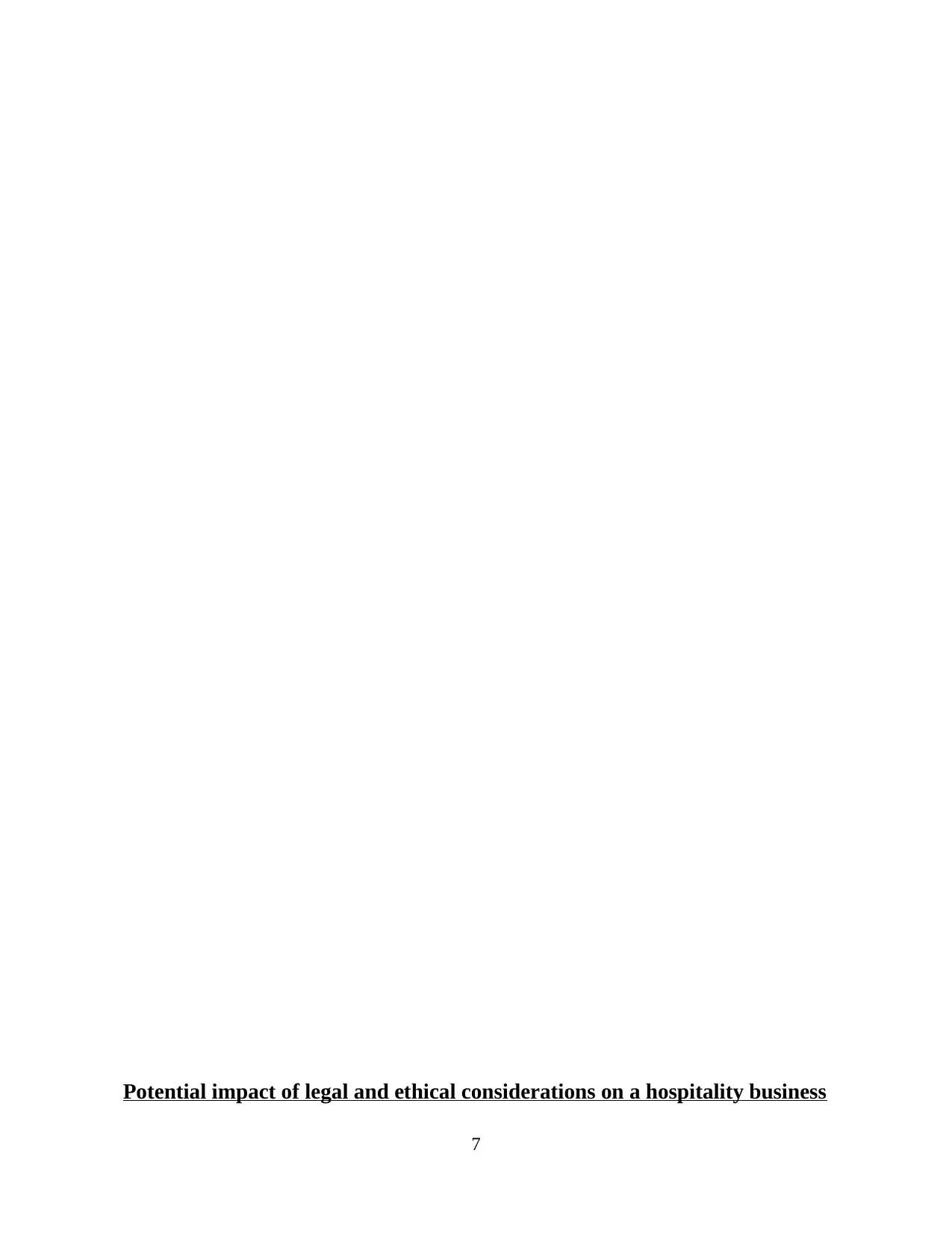
Potential impact of legal and ethical considerations on a hospitality business
7
7
⊘ This is a preview!⊘
Do you want full access?
Subscribe today to unlock all pages.

Trusted by 1+ million students worldwide
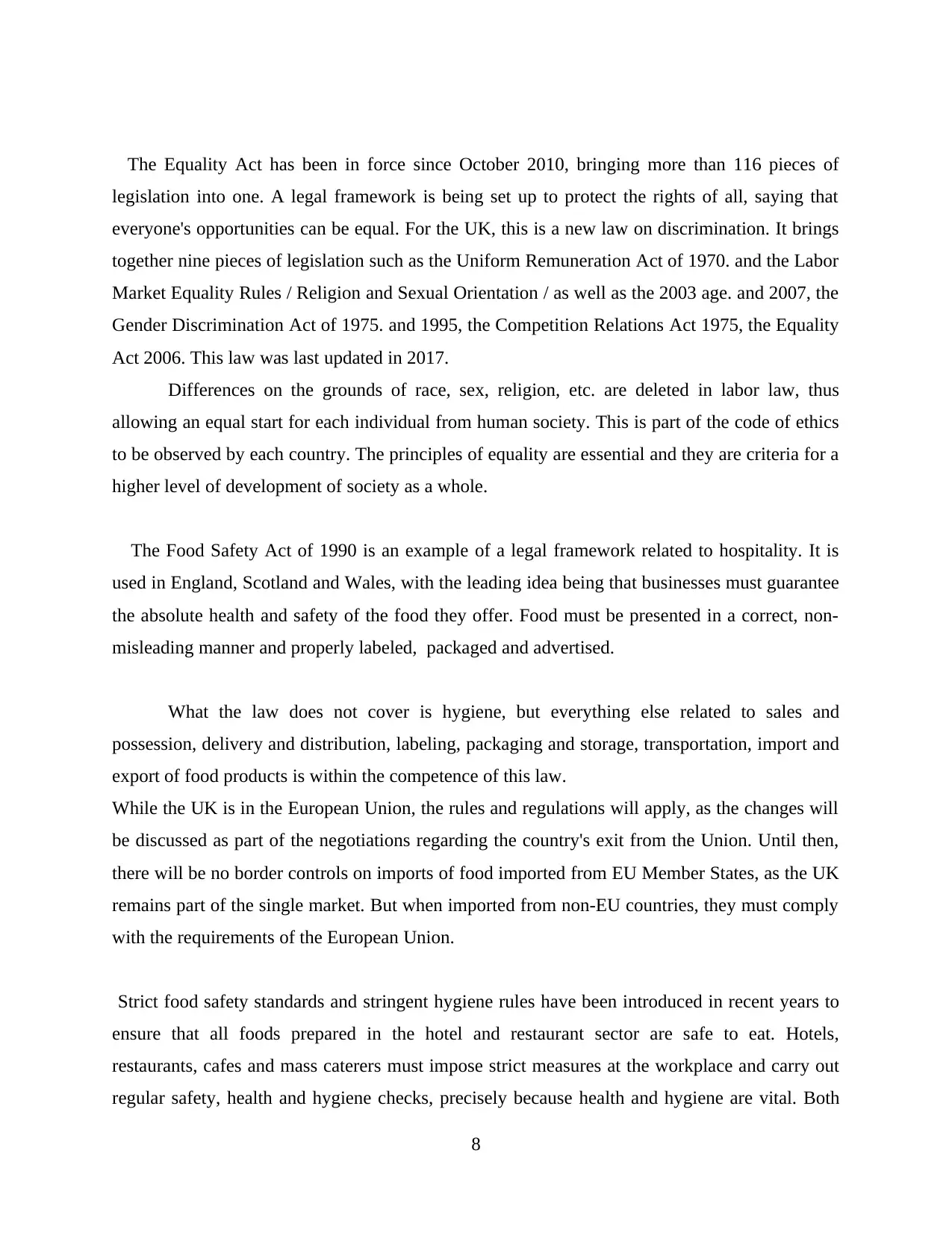
The Equality Act has been in force since October 2010, bringing more than 116 pieces of
legislation into one. A legal framework is being set up to protect the rights of all, saying that
everyone's opportunities can be equal. For the UK, this is a new law on discrimination. It brings
together nine pieces of legislation such as the Uniform Remuneration Act of 1970. and the Labor
Market Equality Rules / Religion and Sexual Orientation / as well as the 2003 age. and 2007, the
Gender Discrimination Act of 1975. and 1995, the Competition Relations Act 1975, the Equality
Act 2006. This law was last updated in 2017.
Differences on the grounds of race, sex, religion, etc. are deleted in labor law, thus
allowing an equal start for each individual from human society. This is part of the code of ethics
to be observed by each country. The principles of equality are essential and they are criteria for a
higher level of development of society as a whole.
The Food Safety Act of 1990 is an example of a legal framework related to hospitality. It is
used in England, Scotland and Wales, with the leading idea being that businesses must guarantee
the absolute health and safety of the food they offer. Food must be presented in a correct, non-
misleading manner and properly labeled, packaged and advertised.
What the law does not cover is hygiene, but everything else related to sales and
possession, delivery and distribution, labeling, packaging and storage, transportation, import and
export of food products is within the competence of this law.
While the UK is in the European Union, the rules and regulations will apply, as the changes will
be discussed as part of the negotiations regarding the country's exit from the Union. Until then,
there will be no border controls on imports of food imported from EU Member States, as the UK
remains part of the single market. But when imported from non-EU countries, they must comply
with the requirements of the European Union.
Strict food safety standards and stringent hygiene rules have been introduced in recent years to
ensure that all foods prepared in the hotel and restaurant sector are safe to eat. Hotels,
restaurants, cafes and mass caterers must impose strict measures at the workplace and carry out
regular safety, health and hygiene checks, precisely because health and hygiene are vital. Both
8
legislation into one. A legal framework is being set up to protect the rights of all, saying that
everyone's opportunities can be equal. For the UK, this is a new law on discrimination. It brings
together nine pieces of legislation such as the Uniform Remuneration Act of 1970. and the Labor
Market Equality Rules / Religion and Sexual Orientation / as well as the 2003 age. and 2007, the
Gender Discrimination Act of 1975. and 1995, the Competition Relations Act 1975, the Equality
Act 2006. This law was last updated in 2017.
Differences on the grounds of race, sex, religion, etc. are deleted in labor law, thus
allowing an equal start for each individual from human society. This is part of the code of ethics
to be observed by each country. The principles of equality are essential and they are criteria for a
higher level of development of society as a whole.
The Food Safety Act of 1990 is an example of a legal framework related to hospitality. It is
used in England, Scotland and Wales, with the leading idea being that businesses must guarantee
the absolute health and safety of the food they offer. Food must be presented in a correct, non-
misleading manner and properly labeled, packaged and advertised.
What the law does not cover is hygiene, but everything else related to sales and
possession, delivery and distribution, labeling, packaging and storage, transportation, import and
export of food products is within the competence of this law.
While the UK is in the European Union, the rules and regulations will apply, as the changes will
be discussed as part of the negotiations regarding the country's exit from the Union. Until then,
there will be no border controls on imports of food imported from EU Member States, as the UK
remains part of the single market. But when imported from non-EU countries, they must comply
with the requirements of the European Union.
Strict food safety standards and stringent hygiene rules have been introduced in recent years to
ensure that all foods prepared in the hotel and restaurant sector are safe to eat. Hotels,
restaurants, cafes and mass caterers must impose strict measures at the workplace and carry out
regular safety, health and hygiene checks, precisely because health and hygiene are vital. Both
8
Paraphrase This Document
Need a fresh take? Get an instant paraphrase of this document with our AI Paraphraser
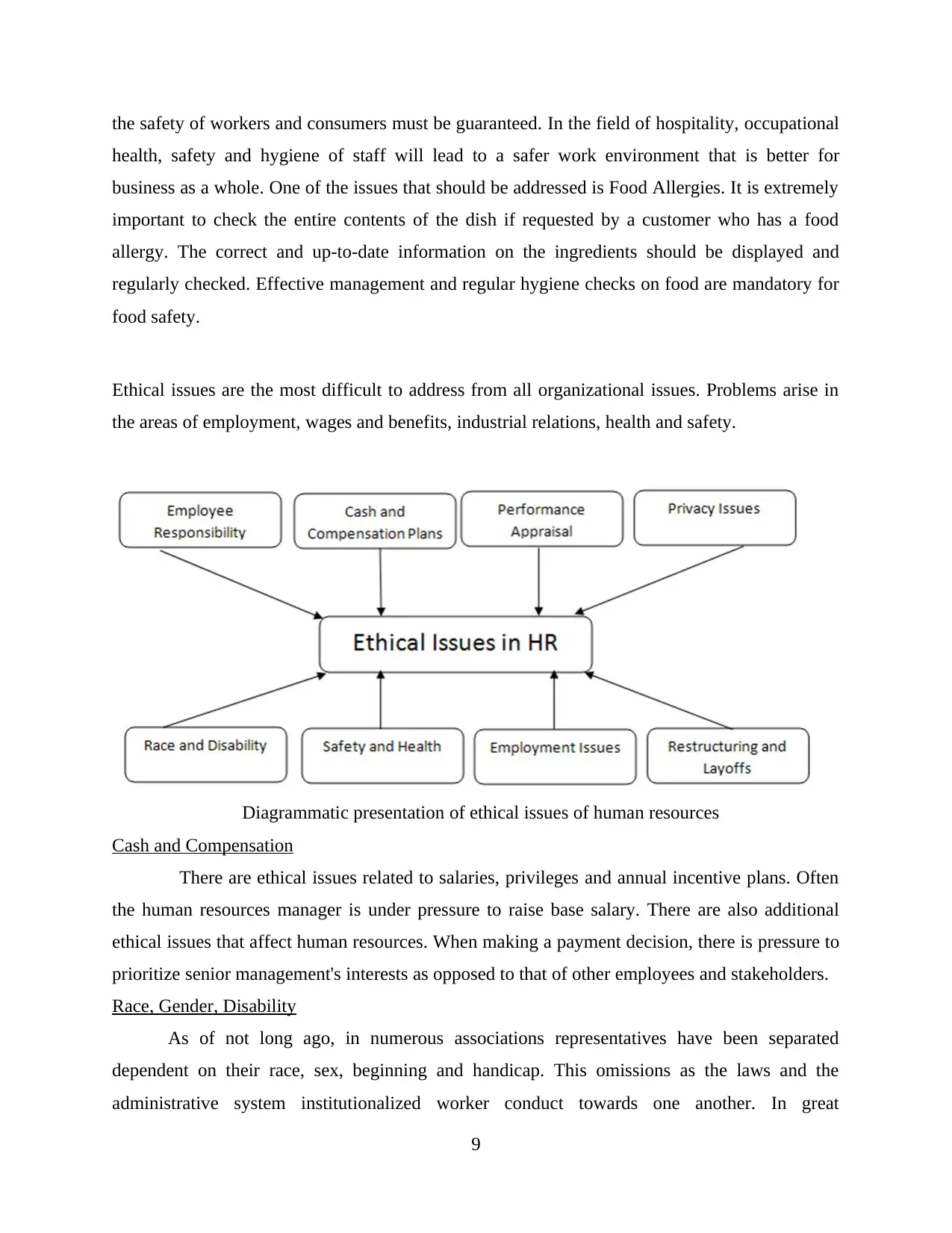
the safety of workers and consumers must be guaranteed. In the field of hospitality, occupational
health, safety and hygiene of staff will lead to a safer work environment that is better for
business as a whole. One of the issues that should be addressed is Food Allergies. It is extremely
important to check the entire contents of the dish if requested by a customer who has a food
allergy. The correct and up-to-date information on the ingredients should be displayed and
regularly checked. Effective management and regular hygiene checks on food are mandatory for
food safety.
Ethical issues are the most difficult to address from all organizational issues. Problems arise in
the areas of employment, wages and benefits, industrial relations, health and safety.
Diagrammatic presentation of ethical issues of human resources
Cash and Compensation
There are ethical issues related to salaries, privileges and annual incentive plans. Often
the human resources manager is under pressure to raise base salary. There are also additional
ethical issues that affect human resources. When making a payment decision, there is pressure to
prioritize senior management's interests as opposed to that of other employees and stakeholders.
Race, Gender, Disability
As of not long ago, in numerous associations representatives have been separated
dependent on their race, sex, beginning and handicap. This omissions as the laws and the
administrative system institutionalized worker conduct towards one another. In great
9
health, safety and hygiene of staff will lead to a safer work environment that is better for
business as a whole. One of the issues that should be addressed is Food Allergies. It is extremely
important to check the entire contents of the dish if requested by a customer who has a food
allergy. The correct and up-to-date information on the ingredients should be displayed and
regularly checked. Effective management and regular hygiene checks on food are mandatory for
food safety.
Ethical issues are the most difficult to address from all organizational issues. Problems arise in
the areas of employment, wages and benefits, industrial relations, health and safety.
Diagrammatic presentation of ethical issues of human resources
Cash and Compensation
There are ethical issues related to salaries, privileges and annual incentive plans. Often
the human resources manager is under pressure to raise base salary. There are also additional
ethical issues that affect human resources. When making a payment decision, there is pressure to
prioritize senior management's interests as opposed to that of other employees and stakeholders.
Race, Gender, Disability
As of not long ago, in numerous associations representatives have been separated
dependent on their race, sex, beginning and handicap. This omissions as the laws and the
administrative system institutionalized worker conduct towards one another. In great
9

associations, the main separating component is execution. Pioneers are prepared to tailor conduct
and maintain a strategic distance from prejudicial practices.
Confidentiality Issues
Everyone who works in any organization has the right to privacy, such as religion,
political convictions, etc., which must be respected. There are also issues that concern health,
safety, restructuring and dismissal.
how company, employment and contract law has a potential impact upon
business decision making in the hospitality industry
The affect of employment, company as well as contract law on decision making within the
hospitality sector are as follows:
Company Law: This law affects on the decision making of event manager positively as
well as negatively. It is important for the companies to gain proper knowledge about this laws
and then make changes or alteration in policies so that they can implement business activities in
a smooth and effective manner.
Employment Law: One of the major asset for an organization is its talented and skilled
employees. They play vital role in gaining success and execution of business activities. It is
important for event manager to follow or perform employment laws in an effective manner that
leads to better decision making.
Contract Law: As per this law, agreement takes place among two parties and they need
to follow all the legislation that is written in the statement. Modifications in this law affect on the
decision making of event manager positively as well as negatively.
The importance of coordination and integrating the various functions of
departments in the hospitality sector
Functional roles in the hotel industry are linked in one way or another because they work in
one system and are one.
The separate departments of the hotel are:
- Human Resources
- Food and drinks
10
and maintain a strategic distance from prejudicial practices.
Confidentiality Issues
Everyone who works in any organization has the right to privacy, such as religion,
political convictions, etc., which must be respected. There are also issues that concern health,
safety, restructuring and dismissal.
how company, employment and contract law has a potential impact upon
business decision making in the hospitality industry
The affect of employment, company as well as contract law on decision making within the
hospitality sector are as follows:
Company Law: This law affects on the decision making of event manager positively as
well as negatively. It is important for the companies to gain proper knowledge about this laws
and then make changes or alteration in policies so that they can implement business activities in
a smooth and effective manner.
Employment Law: One of the major asset for an organization is its talented and skilled
employees. They play vital role in gaining success and execution of business activities. It is
important for event manager to follow or perform employment laws in an effective manner that
leads to better decision making.
Contract Law: As per this law, agreement takes place among two parties and they need
to follow all the legislation that is written in the statement. Modifications in this law affect on the
decision making of event manager positively as well as negatively.
The importance of coordination and integrating the various functions of
departments in the hospitality sector
Functional roles in the hotel industry are linked in one way or another because they work in
one system and are one.
The separate departments of the hotel are:
- Human Resources
- Food and drinks
10
⊘ This is a preview!⊘
Do you want full access?
Subscribe today to unlock all pages.

Trusted by 1+ million students worldwide
1 out of 17
Related Documents
Your All-in-One AI-Powered Toolkit for Academic Success.
+13062052269
info@desklib.com
Available 24*7 on WhatsApp / Email
![[object Object]](/_next/static/media/star-bottom.7253800d.svg)
Unlock your academic potential
Copyright © 2020–2026 A2Z Services. All Rights Reserved. Developed and managed by ZUCOL.





